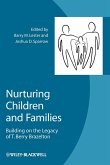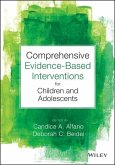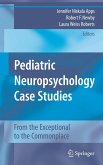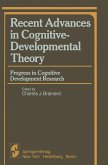Nurturing Children and Families
Building on the Legacy of T. Berry Brazelton
Herausgegeben von Lester, Barry M.; Sparrow, Joshua D.
Nurturing Children and Families
Building on the Legacy of T. Berry Brazelton
Herausgegeben von Lester, Barry M.; Sparrow, Joshua D.
- Gebundenes Buch
- Merkliste
- Auf die Merkliste
- Bewerten Bewerten
- Teilen
- Produkt teilen
- Produkterinnerung
- Produkterinnerung
This volume celebrates the work and influence of T. Berry Brazelton, one of the world s foremost pediatricians, by bringing together contributions from researchers and clinicians whose own pioneering work has been inspired by Brazelton s foundations in the field of child development.
Includes contributions from experts influenced by the work of Brazelton from a wide range of fields, including pediatrics, psychology, nursing, early childhood education, occupational therapy, and public policy
Provides an overview of the field of child development, from the explosion of infant research in…mehr
Andere Kunden interessierten sich auch für
![Nurturing Children Families Nurturing Children Families]() Nurturing Children Families53,99 €
Nurturing Children Families53,99 €![Oppositional Defiant Disorder and Conduct Disorder in Childhood Oppositional Defiant Disorder and Conduct Disorder in Childhood]() Walter MatthysOppositional Defiant Disorder and Conduct Disorder in Childhood72,99 €
Walter MatthysOppositional Defiant Disorder and Conduct Disorder in Childhood72,99 €![Comprehensive Evidence-Based Interventions for Children and Adolescents Comprehensive Evidence-Based Interventions for Children and Adolescents]() Comprehensive Evidence-Based Interventions for Children and Adolescents75,99 €
Comprehensive Evidence-Based Interventions for Children and Adolescents75,99 €![The Development of Children and Adolescents The Development of Children and Adolescents]() Penny Hauser-CramThe Development of Children and Adolescents270,99 €
Penny Hauser-CramThe Development of Children and Adolescents270,99 €![Pediatric Neuropsychology Case Studies Pediatric Neuropsychology Case Studies]() Jennifer A.N. Apps / Robert F. Newby / Laura Weiss Roberts (eds.)Pediatric Neuropsychology Case Studies149,99 €
Jennifer A.N. Apps / Robert F. Newby / Laura Weiss Roberts (eds.)Pediatric Neuropsychology Case Studies149,99 €![Recent Advances in Cognitive-Developmental Theory Recent Advances in Cognitive-Developmental Theory]() Recent Advances in Cognitive-Developmental Theory111,99 €
Recent Advances in Cognitive-Developmental Theory111,99 €![Authoritative Communities Authoritative Communities]() Kathleen Kovner Kline (ed.)Authoritative Communities57,99 €
Kathleen Kovner Kline (ed.)Authoritative Communities57,99 €-
-
-
This volume celebrates the work and influence of T. Berry Brazelton, one of the world s foremost pediatricians, by bringing together contributions from researchers and clinicians whose own pioneering work has been inspired by Brazelton s foundations in the field of child development.
Includes contributions from experts influenced by the work of Brazelton from a wide range of fields, including pediatrics, psychology, nursing, early childhood education, occupational therapy, and public policy
Provides an overview of the field of child development, from the explosion of infant research in the 1960s to contemporary studies
Outlines the achievements and influence of T. Berry Brazelton, one of the world s foremost pediatricians, and his lasting influence in continuing research, practice, and public policy
Hinweis: Dieser Artikel kann nur an eine deutsche Lieferadresse ausgeliefert werden.
Includes contributions from experts influenced by the work of Brazelton from a wide range of fields, including pediatrics, psychology, nursing, early childhood education, occupational therapy, and public policy
Provides an overview of the field of child development, from the explosion of infant research in the 1960s to contemporary studies
Outlines the achievements and influence of T. Berry Brazelton, one of the world s foremost pediatricians, and his lasting influence in continuing research, practice, and public policy
Hinweis: Dieser Artikel kann nur an eine deutsche Lieferadresse ausgeliefert werden.
Produktdetails
- Produktdetails
- Verlag: Wiley & Sons
- 1. Auflage
- Seitenzahl: 416
- Erscheinungstermin: 30. August 2010
- Englisch
- Abmessung: 238mm x 167mm x 29mm
- Gewicht: 726g
- ISBN-13: 9781405196000
- ISBN-10: 1405196009
- Artikelnr.: 30949261
- Herstellerkennzeichnung
- Libri GmbH
- Europaallee 1
- 36244 Bad Hersfeld
- gpsr@libri.de
- Verlag: Wiley & Sons
- 1. Auflage
- Seitenzahl: 416
- Erscheinungstermin: 30. August 2010
- Englisch
- Abmessung: 238mm x 167mm x 29mm
- Gewicht: 726g
- ISBN-13: 9781405196000
- ISBN-10: 1405196009
- Artikelnr.: 30949261
- Herstellerkennzeichnung
- Libri GmbH
- Europaallee 1
- 36244 Bad Hersfeld
- gpsr@libri.de
Barry M. Lester, PhD is Professor of Psychiatry and Human Behavior, Professor of Pediatrics and founding Director of the Center for the Study of Children at Risk, Brown University Alpert Medical School and Women and Infants Hospital. His research has addressed processes of development in children at risk due to biological and social factors. His research has been continuously funded by the NIH for over 25 years. Dr. Lester was a member of the Council at the NIH National Institute on Drug Abuse. He directs the Infant and Child Mental Health Post-Baccalaureate Certificate Program at Brown University and is past President of the International Association for Infant Mental Health. He is the author of several hundred peer-reviewed publications and 16 books, including Why is My Baby Crying? Joshua D. Sparrow, MD is Director of Special Initiatives at the Brazelton Touchpoints Center, Children's Hospital, Boston, and Assistant Professor in Psychiatry at the Harvard Medical School. He has co-authored eight books with Dr. T. Berry Brazelton, and revised with him the second edition of Touchpoints Birth to Three: Your Child's Emotional and Behavioral Development. His work focuses on the social determinants of development and health, and culturally informed adaptations of interventions that catalyze community healing and self-strengthening processes.
Introduction (Joshua Sparrow and Barry Lester).
A Tribute to T. Berry Brazelton: Excerpted remarks from Pioneering Change
Symposium, November 15, 2008, in honor of Dr. Brazelton's life's work (
Geoffrey Canada).
PART I: A SCIENTIFIC REVOLUTION IN BEHAVIORAL AND DEVELOPMENTAL RESEARCH.
Section I: Changing Paradigms.
1. Transforming the Research Landscape (Barry Lester).
2. Aligning Systems of Care with the Relational Imperative of Development:
Building Community through Collaborative Consultation (Joshua Sparrow).
Section II: Advances in Understanding Fetal and Newborn Behavior.
3. Before Infant Assessment: Fetal Neurobehavior (Amy L. Salisbury).
4. The Development of the NBAS -- A Turning Point in Understanding the
Newborn (J. Kevin Nugent).
5. Keys to Developing Early Parent-Child Relationships (Kathryn E. Barnard
).
6. Prenatal Depression Effects on Neurobehavioral Dysregulation (Tiffany
Field).
Section III: Self-Regulatory and Relational Processes.
7. A New Look at Parent-Infant Interaction: Infant Arousal Dynamics (
Daniel N. Stern).
8. Infants and Mothers: Self- and Mutual Regulation and Meaning Making (Ed
Tronick).
Section IV: Regression and Reorganization in Relational Models of
Development.
9. Patterns of Instability and Change: Observations on Regression Periods
in Typically Developing Infants (Mikeal Heimann).
10. The 4 WHY'S of Age Linked Regression Periods in Infancy (Frans X.
Plooij).
Section V: Relational and Contextual Developmental Models.
11. An Ethical Framework for Educating Children with Special Needs and All
Children (Stanley I. Greenspan).
12. Protective Environments in Africa and Elsewhere (Robert A. LeVine).
Section VI: Neuroscience Perspectives on Relational and Developmental
Models.
13. A Neurobiological Perspective of the Work of Berry Brazelton (Allan N.
Schore).
14. Hidden Regulators within the Mother-Infant Interaction (Myron Hofer).
15. Temperament as Sets of Preparedness (Jerome Kagan).
PART II: FROM THEORY TO PRACTICE: INNOVATIONS IN CLINICAL INTERVENTION.
Section I: Preventive Interventions: Home Visitation.
16. Touchpoints in a Nurse Visiting Program (Kristie Brandt and J. Michael
Murphy).
17. The Nurse Family Partnership: Honoring T. Berry Brazelton (David L.
Olds).
Section II: Early Interventions: The Care of Infants Born Preterm
18. Understanding the Preterm Infant (Heidelise Als).
19. Fueling Development by Enhancing Infant-Caregiver Relationships:
Transformation in the Developmental Therapies (Rosemary Bigsby).
Section III: Infant Mental Health and the Treatment of Early Trauma.
20. Infant Mental Health (Charles H. Zeanah and Paula Doyle Zeanah).
21. Ghosts and Angels in the Nursery: Conflict and Hope in Raising Babies
(Alicia Lieberman and William Harris).
22. Understanding and Helping Traumatized Infants and Families (Joy D.
Osofsky and Howard J. Osofsky).
23. Child Maltreatment: The Research Imperative and the Exportation of
Results to Clinical Contexts (Dante Ciccheti and Sheree L. Toth).
PART III: TRANSLATIONAL SCIENCE: IMPLICATIONS FOR PROFESSIONAL DEVELOPMENT,
SYSTEMS OF CARE, AND POLICY.
Section I: Changing Practice and Improving Care through Professional
Development.
24. Developing the Infant Mental Health Workforce: Opportunities,
Challenges and Strengths for Translating Research to Professional
Development and Practice (Libby Zimmerman).
25. The Touchpoints Approach for Early Childhood Care and Education
Providers (Jayne Singer and John Hornstein).
26. Early Innovations in Behavioral/Developmental Pediatric Fellowship
Training -- A Fresh Approach to Medical Professional Development (
Constance H. Keefer).
Section II: Innovating Change in Service Delivery, Systems of Care, and
Policy.
27. The Birth of Child Life: Creating a Child-Friendly Hospital
Environment (Myra D. Fox).
28. Improving Healthcare Service Delivery Systems and Outcomes with
Relationship-based Nursing Practices (Ann C. Stadtler, Julie C. Novak,
Joshua Sparrow).
29. Translating the Science of Early Childhood Development into Policy and
Practice (Daniel Pedersen and Jack P. Shonkoff).
30. Placing Relationships at the Core of Early Care and Education Programs
(Francine Jacobs, Mallary I. Swartz, Jessica Dym Bartlett, M. Ann
Easterbrooks).
Section III: Changing Ways of Being.
31. Respect and Healing (Sara Lawrence-Lightfoot).
Index.
A Tribute to T. Berry Brazelton: Excerpted remarks from Pioneering Change
Symposium, November 15, 2008, in honor of Dr. Brazelton's life's work (
Geoffrey Canada).
PART I: A SCIENTIFIC REVOLUTION IN BEHAVIORAL AND DEVELOPMENTAL RESEARCH.
Section I: Changing Paradigms.
1. Transforming the Research Landscape (Barry Lester).
2. Aligning Systems of Care with the Relational Imperative of Development:
Building Community through Collaborative Consultation (Joshua Sparrow).
Section II: Advances in Understanding Fetal and Newborn Behavior.
3. Before Infant Assessment: Fetal Neurobehavior (Amy L. Salisbury).
4. The Development of the NBAS -- A Turning Point in Understanding the
Newborn (J. Kevin Nugent).
5. Keys to Developing Early Parent-Child Relationships (Kathryn E. Barnard
).
6. Prenatal Depression Effects on Neurobehavioral Dysregulation (Tiffany
Field).
Section III: Self-Regulatory and Relational Processes.
7. A New Look at Parent-Infant Interaction: Infant Arousal Dynamics (
Daniel N. Stern).
8. Infants and Mothers: Self- and Mutual Regulation and Meaning Making (Ed
Tronick).
Section IV: Regression and Reorganization in Relational Models of
Development.
9. Patterns of Instability and Change: Observations on Regression Periods
in Typically Developing Infants (Mikeal Heimann).
10. The 4 WHY'S of Age Linked Regression Periods in Infancy (Frans X.
Plooij).
Section V: Relational and Contextual Developmental Models.
11. An Ethical Framework for Educating Children with Special Needs and All
Children (Stanley I. Greenspan).
12. Protective Environments in Africa and Elsewhere (Robert A. LeVine).
Section VI: Neuroscience Perspectives on Relational and Developmental
Models.
13. A Neurobiological Perspective of the Work of Berry Brazelton (Allan N.
Schore).
14. Hidden Regulators within the Mother-Infant Interaction (Myron Hofer).
15. Temperament as Sets of Preparedness (Jerome Kagan).
PART II: FROM THEORY TO PRACTICE: INNOVATIONS IN CLINICAL INTERVENTION.
Section I: Preventive Interventions: Home Visitation.
16. Touchpoints in a Nurse Visiting Program (Kristie Brandt and J. Michael
Murphy).
17. The Nurse Family Partnership: Honoring T. Berry Brazelton (David L.
Olds).
Section II: Early Interventions: The Care of Infants Born Preterm
18. Understanding the Preterm Infant (Heidelise Als).
19. Fueling Development by Enhancing Infant-Caregiver Relationships:
Transformation in the Developmental Therapies (Rosemary Bigsby).
Section III: Infant Mental Health and the Treatment of Early Trauma.
20. Infant Mental Health (Charles H. Zeanah and Paula Doyle Zeanah).
21. Ghosts and Angels in the Nursery: Conflict and Hope in Raising Babies
(Alicia Lieberman and William Harris).
22. Understanding and Helping Traumatized Infants and Families (Joy D.
Osofsky and Howard J. Osofsky).
23. Child Maltreatment: The Research Imperative and the Exportation of
Results to Clinical Contexts (Dante Ciccheti and Sheree L. Toth).
PART III: TRANSLATIONAL SCIENCE: IMPLICATIONS FOR PROFESSIONAL DEVELOPMENT,
SYSTEMS OF CARE, AND POLICY.
Section I: Changing Practice and Improving Care through Professional
Development.
24. Developing the Infant Mental Health Workforce: Opportunities,
Challenges and Strengths for Translating Research to Professional
Development and Practice (Libby Zimmerman).
25. The Touchpoints Approach for Early Childhood Care and Education
Providers (Jayne Singer and John Hornstein).
26. Early Innovations in Behavioral/Developmental Pediatric Fellowship
Training -- A Fresh Approach to Medical Professional Development (
Constance H. Keefer).
Section II: Innovating Change in Service Delivery, Systems of Care, and
Policy.
27. The Birth of Child Life: Creating a Child-Friendly Hospital
Environment (Myra D. Fox).
28. Improving Healthcare Service Delivery Systems and Outcomes with
Relationship-based Nursing Practices (Ann C. Stadtler, Julie C. Novak,
Joshua Sparrow).
29. Translating the Science of Early Childhood Development into Policy and
Practice (Daniel Pedersen and Jack P. Shonkoff).
30. Placing Relationships at the Core of Early Care and Education Programs
(Francine Jacobs, Mallary I. Swartz, Jessica Dym Bartlett, M. Ann
Easterbrooks).
Section III: Changing Ways of Being.
31. Respect and Healing (Sara Lawrence-Lightfoot).
Index.
Introduction (Joshua Sparrow and Barry Lester).
A Tribute to T. Berry Brazelton: Excerpted remarks from Pioneering Change
Symposium, November 15, 2008, in honor of Dr. Brazelton's life's work (
Geoffrey Canada).
PART I: A SCIENTIFIC REVOLUTION IN BEHAVIORAL AND DEVELOPMENTAL RESEARCH.
Section I: Changing Paradigms.
1. Transforming the Research Landscape (Barry Lester).
2. Aligning Systems of Care with the Relational Imperative of Development:
Building Community through Collaborative Consultation (Joshua Sparrow).
Section II: Advances in Understanding Fetal and Newborn Behavior.
3. Before Infant Assessment: Fetal Neurobehavior (Amy L. Salisbury).
4. The Development of the NBAS -- A Turning Point in Understanding the
Newborn (J. Kevin Nugent).
5. Keys to Developing Early Parent-Child Relationships (Kathryn E. Barnard
).
6. Prenatal Depression Effects on Neurobehavioral Dysregulation (Tiffany
Field).
Section III: Self-Regulatory and Relational Processes.
7. A New Look at Parent-Infant Interaction: Infant Arousal Dynamics (
Daniel N. Stern).
8. Infants and Mothers: Self- and Mutual Regulation and Meaning Making (Ed
Tronick).
Section IV: Regression and Reorganization in Relational Models of
Development.
9. Patterns of Instability and Change: Observations on Regression Periods
in Typically Developing Infants (Mikeal Heimann).
10. The 4 WHY'S of Age Linked Regression Periods in Infancy (Frans X.
Plooij).
Section V: Relational and Contextual Developmental Models.
11. An Ethical Framework for Educating Children with Special Needs and All
Children (Stanley I. Greenspan).
12. Protective Environments in Africa and Elsewhere (Robert A. LeVine).
Section VI: Neuroscience Perspectives on Relational and Developmental
Models.
13. A Neurobiological Perspective of the Work of Berry Brazelton (Allan N.
Schore).
14. Hidden Regulators within the Mother-Infant Interaction (Myron Hofer).
15. Temperament as Sets of Preparedness (Jerome Kagan).
PART II: FROM THEORY TO PRACTICE: INNOVATIONS IN CLINICAL INTERVENTION.
Section I: Preventive Interventions: Home Visitation.
16. Touchpoints in a Nurse Visiting Program (Kristie Brandt and J. Michael
Murphy).
17. The Nurse Family Partnership: Honoring T. Berry Brazelton (David L.
Olds).
Section II: Early Interventions: The Care of Infants Born Preterm
18. Understanding the Preterm Infant (Heidelise Als).
19. Fueling Development by Enhancing Infant-Caregiver Relationships:
Transformation in the Developmental Therapies (Rosemary Bigsby).
Section III: Infant Mental Health and the Treatment of Early Trauma.
20. Infant Mental Health (Charles H. Zeanah and Paula Doyle Zeanah).
21. Ghosts and Angels in the Nursery: Conflict and Hope in Raising Babies
(Alicia Lieberman and William Harris).
22. Understanding and Helping Traumatized Infants and Families (Joy D.
Osofsky and Howard J. Osofsky).
23. Child Maltreatment: The Research Imperative and the Exportation of
Results to Clinical Contexts (Dante Ciccheti and Sheree L. Toth).
PART III: TRANSLATIONAL SCIENCE: IMPLICATIONS FOR PROFESSIONAL DEVELOPMENT,
SYSTEMS OF CARE, AND POLICY.
Section I: Changing Practice and Improving Care through Professional
Development.
24. Developing the Infant Mental Health Workforce: Opportunities,
Challenges and Strengths for Translating Research to Professional
Development and Practice (Libby Zimmerman).
25. The Touchpoints Approach for Early Childhood Care and Education
Providers (Jayne Singer and John Hornstein).
26. Early Innovations in Behavioral/Developmental Pediatric Fellowship
Training -- A Fresh Approach to Medical Professional Development (
Constance H. Keefer).
Section II: Innovating Change in Service Delivery, Systems of Care, and
Policy.
27. The Birth of Child Life: Creating a Child-Friendly Hospital
Environment (Myra D. Fox).
28. Improving Healthcare Service Delivery Systems and Outcomes with
Relationship-based Nursing Practices (Ann C. Stadtler, Julie C. Novak,
Joshua Sparrow).
29. Translating the Science of Early Childhood Development into Policy and
Practice (Daniel Pedersen and Jack P. Shonkoff).
30. Placing Relationships at the Core of Early Care and Education Programs
(Francine Jacobs, Mallary I. Swartz, Jessica Dym Bartlett, M. Ann
Easterbrooks).
Section III: Changing Ways of Being.
31. Respect and Healing (Sara Lawrence-Lightfoot).
Index.
A Tribute to T. Berry Brazelton: Excerpted remarks from Pioneering Change
Symposium, November 15, 2008, in honor of Dr. Brazelton's life's work (
Geoffrey Canada).
PART I: A SCIENTIFIC REVOLUTION IN BEHAVIORAL AND DEVELOPMENTAL RESEARCH.
Section I: Changing Paradigms.
1. Transforming the Research Landscape (Barry Lester).
2. Aligning Systems of Care with the Relational Imperative of Development:
Building Community through Collaborative Consultation (Joshua Sparrow).
Section II: Advances in Understanding Fetal and Newborn Behavior.
3. Before Infant Assessment: Fetal Neurobehavior (Amy L. Salisbury).
4. The Development of the NBAS -- A Turning Point in Understanding the
Newborn (J. Kevin Nugent).
5. Keys to Developing Early Parent-Child Relationships (Kathryn E. Barnard
).
6. Prenatal Depression Effects on Neurobehavioral Dysregulation (Tiffany
Field).
Section III: Self-Regulatory and Relational Processes.
7. A New Look at Parent-Infant Interaction: Infant Arousal Dynamics (
Daniel N. Stern).
8. Infants and Mothers: Self- and Mutual Regulation and Meaning Making (Ed
Tronick).
Section IV: Regression and Reorganization in Relational Models of
Development.
9. Patterns of Instability and Change: Observations on Regression Periods
in Typically Developing Infants (Mikeal Heimann).
10. The 4 WHY'S of Age Linked Regression Periods in Infancy (Frans X.
Plooij).
Section V: Relational and Contextual Developmental Models.
11. An Ethical Framework for Educating Children with Special Needs and All
Children (Stanley I. Greenspan).
12. Protective Environments in Africa and Elsewhere (Robert A. LeVine).
Section VI: Neuroscience Perspectives on Relational and Developmental
Models.
13. A Neurobiological Perspective of the Work of Berry Brazelton (Allan N.
Schore).
14. Hidden Regulators within the Mother-Infant Interaction (Myron Hofer).
15. Temperament as Sets of Preparedness (Jerome Kagan).
PART II: FROM THEORY TO PRACTICE: INNOVATIONS IN CLINICAL INTERVENTION.
Section I: Preventive Interventions: Home Visitation.
16. Touchpoints in a Nurse Visiting Program (Kristie Brandt and J. Michael
Murphy).
17. The Nurse Family Partnership: Honoring T. Berry Brazelton (David L.
Olds).
Section II: Early Interventions: The Care of Infants Born Preterm
18. Understanding the Preterm Infant (Heidelise Als).
19. Fueling Development by Enhancing Infant-Caregiver Relationships:
Transformation in the Developmental Therapies (Rosemary Bigsby).
Section III: Infant Mental Health and the Treatment of Early Trauma.
20. Infant Mental Health (Charles H. Zeanah and Paula Doyle Zeanah).
21. Ghosts and Angels in the Nursery: Conflict and Hope in Raising Babies
(Alicia Lieberman and William Harris).
22. Understanding and Helping Traumatized Infants and Families (Joy D.
Osofsky and Howard J. Osofsky).
23. Child Maltreatment: The Research Imperative and the Exportation of
Results to Clinical Contexts (Dante Ciccheti and Sheree L. Toth).
PART III: TRANSLATIONAL SCIENCE: IMPLICATIONS FOR PROFESSIONAL DEVELOPMENT,
SYSTEMS OF CARE, AND POLICY.
Section I: Changing Practice and Improving Care through Professional
Development.
24. Developing the Infant Mental Health Workforce: Opportunities,
Challenges and Strengths for Translating Research to Professional
Development and Practice (Libby Zimmerman).
25. The Touchpoints Approach for Early Childhood Care and Education
Providers (Jayne Singer and John Hornstein).
26. Early Innovations in Behavioral/Developmental Pediatric Fellowship
Training -- A Fresh Approach to Medical Professional Development (
Constance H. Keefer).
Section II: Innovating Change in Service Delivery, Systems of Care, and
Policy.
27. The Birth of Child Life: Creating a Child-Friendly Hospital
Environment (Myra D. Fox).
28. Improving Healthcare Service Delivery Systems and Outcomes with
Relationship-based Nursing Practices (Ann C. Stadtler, Julie C. Novak,
Joshua Sparrow).
29. Translating the Science of Early Childhood Development into Policy and
Practice (Daniel Pedersen and Jack P. Shonkoff).
30. Placing Relationships at the Core of Early Care and Education Programs
(Francine Jacobs, Mallary I. Swartz, Jessica Dym Bartlett, M. Ann
Easterbrooks).
Section III: Changing Ways of Being.
31. Respect and Healing (Sara Lawrence-Lightfoot).
Index.








